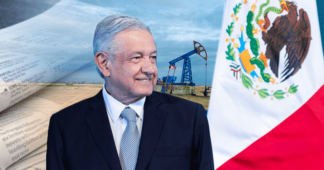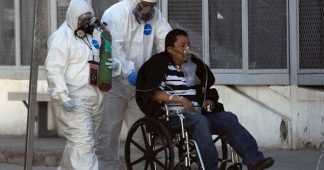By Mishelle Muñoz – Mexico City
With thanks to Diego Ilinich Matus
Taking over the presidency of Mexico, Andrés Manuel López Obrador stated in the ceremony in front of the Congress on December 1st, 2018:
“Friends, by mandate of the people today we begin the fourth political transformation of Mexico, it may seem pretentious or exaggerated, but today a new government not only begins, today a change of political regime begins.
From now on, a peaceful and orderly transformation will take place, but at the same time profound and radical, because it will end the corruption and impunity that has stopped the rebirth of Mexico.
If we define in a few words the three great transformations of our history, we could summarize these as the Independence (1810-1821), when there was a struggle to abolish slavery and achieve national sovereignty; the Reform (1855-1863) for the predominance of civil power and for the restoration of the Republic. And the Revolution (1910-1920), when our people and their extraordinary leaders fought for justice and democracy.”
López Obrador had won the presidency as the candidate of MORENA (Movimiento de Regeneración Nacional – National Regeneration Movement), supported by the Labor Party (PT) and the Party of Social Encounter (PES).
A social and political movement founded in 2011, MORENA currently holds 197 of 500 seats in the Chamber of Deputies and 62 seats of 128 in the Senate. Together with its current coalition partners Labor Party and Green Ecologic Party of Mexico (PVEM), MORENA holds the majority in both houses.
The government of Andrés Manuel López Obrador started working three years ago. We talked with Bertha Luján Uranga, President of the National Council of MORENA, one of the 2 decision-making bodies of the Party, the other being the National Executive Committee, about the challenges, perspectives and meaning of the so-called Fourth Transformation today.
Why talk about the Fourth Transformation in Mexico?
We are living a historical stage in the country, which has to do with the past, the present and the future. With the past, because demands from many decades are being collected. Those demands built an agenda that finally triumphed in 2018, having reached the Presidency of the Republic and the government of several states in Mexico. Now we have an incidence in local governments, incidence in the legislative power, giving rise to these struggles to be concretized in government programs. At this moment we are building based on our demands from the past, from the project that we have been proposing for the country, for the future. We are working for what the 125 million Mexicans need for a decent life in the country.
“The Fourth Transformation means recovering sovereignty and spaces of democracy”
The Fourth Transformation means recovering sovereignty, recovering the spaces of democracy that were lost, transforming through MORENA and other national leftist movements.
What are those conditions that you want to transform?
A change of the regime is intended, so that economic power must be separated from political power.
In the last decades we have lived an alliance of economic and political power that finally made the policies, which we call neoliberal. These were focused on the enrichment of the elites. These policies left the society in a social and economic crisis, which today manifests itself with high levels of poverty and insecurity. This finally has to do with the need for a change of the regime, of the economic model.
“Changing social policies and fiscal policy”
Nowadays a redistributive economic policy is being proposed so that the resources, which are part of the wealth in the country, are distributed in a more egalitarian way. We do not want large sectors of people in poverty on one side and an empowered elite on the other.
We are changing social policies, giving more resources to social programs. But we are also changing the economic model, introducing a much fairer fiscal policy, so that those who earn the most pay more. A social policy that puts universal rights ahead, which anyone should own: food, health, education, housing. And the Fourth Transformation consists of ensuring that these rights are addressed based on very specific government policies and with good results.
After three years of government, what are the main challenges that you face?
Regain people’s trust. Other experiences in Latin America show us the following: When governments that come from the grassroots, when they come from a popular vote, and then they move away from the grassroots, this results in the rise of big problems. Because, historically, the right wing can take a step back, but then it can take two or three steps forward. The fact that we won in 2018 does not mean that we already have everything won for the future. We have to work every day, and we have to make sure that people see this work in their favor. And of course maintaining permanent communication with the people is very important too.
It is one of the objectives of the ‘Mañaneras‘ (daily press conferences that the President of Mexico gives at 7am), which consists of opening the doors of the government palace, every day, confronting the media every day, answering doubts, informing about what is being done.
What is the main area in which progress has been made?
On the issue of equality, programs have been implemented to serve the most vulnerable sectors of the population, to support for example older adults who do not have any social support coverage, children, young people, the indigenous and peasant sectors. There are very specific policies for these sectors, which is not just monthly financial support. Programs that help give a perspective to peoples’ lives. Take for example the (Jóvenes Construyendo el Futuro) ‘Youth Building the Future’ program. It is a support program for young people from 18 to 29 years old, who receive a monthly scholarship in exchange for training in a job that they are developing in a productive work center, or in different economic sectors and that gives them the possibility of having training.
In that year of scholarship, young people acquire skills and professionalization in a job. In my opinion, that has to do not only with financial support but also with an objective of professional training, linked to job banks, which allow the young people to get after that year.
“Recovering from privatizations what is public”
Also, there is a policy to recover national heritage. In the neoliberal era, in the last 30 or 40 years, the collective patrimony of the companies of the energy sector, oil, electricity, was undergoing a process of privatization, in such a way that the public became private. Privatization processes that began in the eighties, nineties and that continued until 2018. It resulted in a concentration of wealth in a few hands. That led to zero growth in the last two decades. Then, the country suffered a generalized process of impoverishment, which today is being responded by recovering what is public.
I think those elements of government policy, of the Fourth Transformation, are very relevant, among other things.
What prospects does the party have towards 2024, the year of next presidential elections?
There is a very positive outlook for the Fourth Transformation movement. There are very palpable policies of the federal government. I believe that the fight against corruption, also what has been done in terms of gaining security in the country, are elements that will be present in any future election. However, it must be said that we must focus, as a party and as a movement, on recovering this bond with the people, with the people who voted for us, 30 million Mexicans who voted in 2018, so that they become 40 millions in 2024.
“More democratic, more inclusive and more just political project”
The federal government is doing its part, and the state governments of MORENA are contributing too. The congresses take initiatives for new laws and changes that consolidate a more democratic, more inclusive and more just political project. All of this must be accompanied by work from our party, and we must reorganize ourselves. We should be very clear about why we are inclusive and what it means. I want to emphasize that we were born as a progressive, plural leftist option. As in a position on the left, we are not from the center or from the right. We are a party that was created to achieve the transformation of the country, the revolution of consciences, to ensure that future generations have opportunities for a dignified life. If the party is consistent with its origin, its objectives, and does a truly grassroots work, this revolution can be achieved.
We cannot stay asleep, and let the right continue a work of lies, slander and the dirty war. We cannot let that happen, or we are not going to ensure that the Fourth Transformation has continuity.
We have a very hard job ahead in these coming three years to achieve continuity in 2024.
“Fourth Transformation means alliance with countries in line with anti-neoliberal, anti-imperialist changes”
Finally, what does the Fourth Transformation imply for international politics?
It implies an alliance with all those countries that are in this line of fundamentally anti-neoliberal, anti-imperialist change. And on the other hand, it means being able to work more and more closely with organizations that are in the same direction. We have global phenomena that unify us, globalize us. In relation to what is needed from below, we must unite, have a common project, join forces and create a real unity.
I think that in the case of Latin America, and in the rest of the world, the Mexican experience can be an example of things that can be achieved. Especially if the project is still successful. That is why it is important that the Fourth Transformation be viable, not only for Mexico, but also as an example for the rest of the world that shares our ideals. To say: It is possible!, despite the power of the transnationals, of the large international financial structures, which are part of the peoples’ crises. Despite these, we are building hope. I believe that the Mexican experience can be a trigger for impacts in other countries.
Bertha Luján Uranga is a certified public accountant. She is a specialist in labor law and union organization, with studies at the Training Institute of the International Labor Organization (ILO) in Italy, as well as at the University of Latin American Workers (UTAL), Venezuela. Since 1970 she has actively participated as a member of the Authentic Labor Front (FAT). During the 90s she was co-founder and national coordinator of the Mexican Action Network against Free Trade, from where she warned that the North American Free Trade Agreement (NAFTA) would bring a gradual loss of the sovereignty of the country and of the labor rights of the workers.
Currently Bertha Lujan is President of the National Council of MORENA.
Published at unitedworldint.com
We remind our readers that publication of articles on our site does not mean that we agree with what is written. Our policy is to publish anything which we consider of interest, so as to assist our readers in forming their opinions. Sometimes we even publish articles with which we totally disagree, since we believe it is important for our readers to be informed on as wide a spectrum of views as possible.











